
Guide
Window cleaning robots compared: which Winbot wins?
by Lorenz Keller

Easy to operate rechargeable battery, low noise, low price. On paper, the Mamibot iGlassbot W200 Skybot sounds promising. However, one thing’s clear from this test: cheap isn’t always good.
A window cleaning robot with rechargeable battery operation for less than 300 francs. That’s what the manufacturer, Mamibot, claims. The cableless Ecovacs models I’ve tested so far cost 450 francs and more.
But can the low-cost technology in the Mamibot iGlassbot W200 Skybot keep up with its cleaning performance?
As soon as I start opening the package, I’m met with several surprises. The manufacturer includes four Velcro mops that you can switch up and attach to the bottom of the robot. Unlike other models, however, you can only use one side of the mop for cleaning before the textile part has to be cleaned in the washing machine.
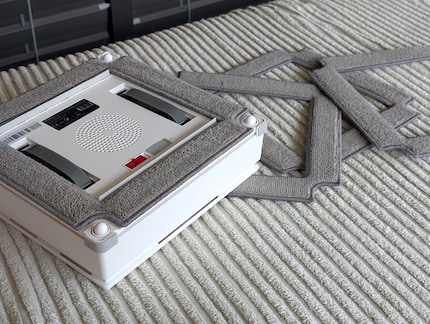
The battery isn’t permanently installed, but can be removed. This is also compulsory because you can’t charge the battery directly in the Mamibot, you have to use a separate charger. On the one hand, this is practical because you can easily replace the battery. On the other hand, you always have to take it out to charge it, which means more work for the user.
As I look closer at the robot, I feel excited to clean my windows wirelessly. Thanks to the battery, the W200 doesn’t need a power cable. And the safety rope isn’t permanently installed either. I don’t need fall protection, because all the glass surfaces lead out onto balconies.
But as soon as I do the first test, I realise I’ve got my hopes up. The robot refuses to start working because the safety rope isn’t set up. You’re supposed to attach this to the window with a suction cup – and clean the area by hand beforehand because the robot won’t cover it.
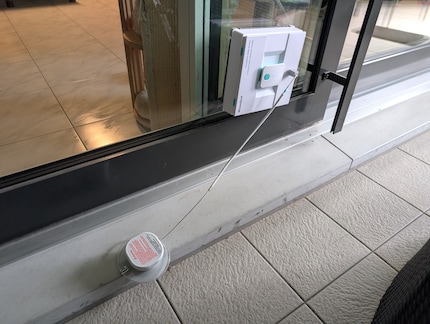
I’m disappointed. I buy a robot window cleaner so that it does the job and cleans my windows. I only want to do the very bare minimum myself. So I improvise and simply place the suction cup on the floor. The robot still works, but it’s not really an ideal solution.
When opening the package, I discover a small plastic bottle with a spray head. You have to use it to spray the mop on the robot. The W200 can’t automatically spray water or cleaning solution onto the window, which most of its competitors can; you have to do this by hand before you start cleaning.
It’s precisely this step where the instructions let you down: although they’re also available in German, they don’t describe exactly how this step works anywhere. The installation videos on YouTube aren’t helpful, as they only show this step briefly and in time-lapse. By the way, cleaning fluid isn’t included.
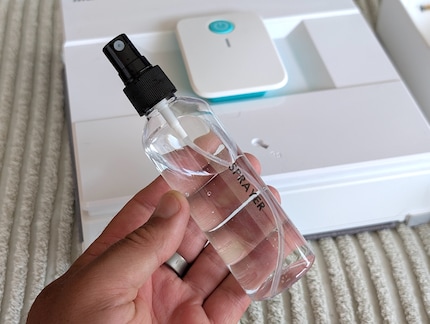
How much liquid does it need? Is water enough or does it get better with window cleaner? I have to find out the answers for myself as I go.
And so the test begins. I spray the square textile mop with water, switch on the robot and press it against the window. It immediately sucks and holds onto the glass. To start the Mamibot, I use the remote control supplied. I select the mode in which it scans the window in vertical paths.
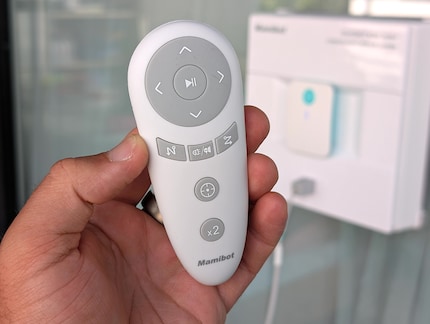
But not much happens after pressing start. The W200 turns agonisingly slowly on the glass. I’ve got a feeling it’s slipping slightly. After about a minute, the robot finally moves all the way down – and starts cleaning vertically. It’s already clear at this point: the robot’s pretty slow.
About two thirds of the way through the glazed balcony door, I suddenly hear a squeak. Is it because of the caterpillars? Have I sprayed on too little liquid?
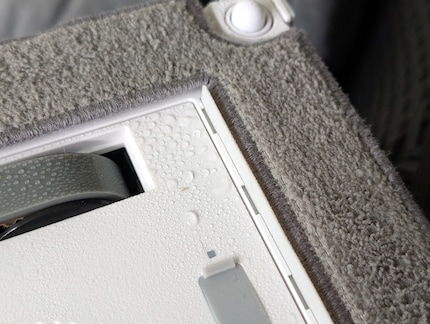
Even after many test runs, I still don’t have the answer to these questions. The squeaking keeps coming back – sometimes after a few minutes, sometimes towards the end of cleaning. One thing’s for sure: it’s not due to the amount of liquid. I’ll share more on that in a moment. It’s more about the cleaning method – I never heard squeaking when the robot swept a surface from left to right. If it has to clean vertically, I could hear the noise from time to time.
Evidence to back up the fact it’s slow comes in the form of figures. I had the Mamibot clean the same 4.18 square metre window as the other window cleaning robots. A normal clean takes more than 18 minutes with the affordable model. With the competition from Ecovacs, it takes seven to nine minutes.
In summary, the amount of liquid is difficult to dose. The larger the window, the wetter the mop needs to be. Because once the robot’s started, I can’t get to the mop unless I stop it and take it off the window. Then the entire cleaning cycle starts all over again.
If the mop’s not damp enough, it can’t clean the entire window properly. If it’s too wet, it leaves streaks, especially at the beginning. Over time, I figured out the perfect dosage. This doesn’t change the obvious downside to this when you compare it to the competition, which regularly sprays the windshield automatically.
By the way, normal glass cleaner or window cleaner will clean the windows better than water alone.
Overall, the results from the clean are okay. The robot removes everyday dirt and pollen from the windows. However, the W200 doesn’t always drive close enough to the edges, where I occasionally discover dirty areas.
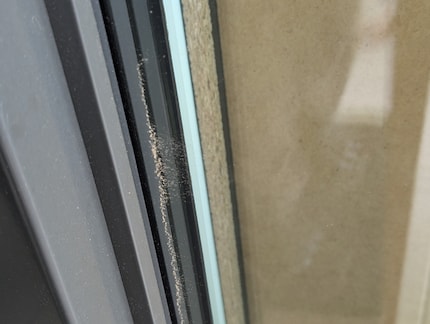
Unfortunately, this happens again and again. Halfway through, the robot has the feeling that it’s finished. Then I have to restart it – and only then does it clean the entire surface. What’s also tiring is that, unlike the Ecovacs models, it doesn’t return to the exact starting point once cleaning is complete. It’s often about a meter off the mark, but has also stopped somewhere on the edge or in a corner on several occasions. Not great when this happens 2.60 metres above me, behind an obstacle.
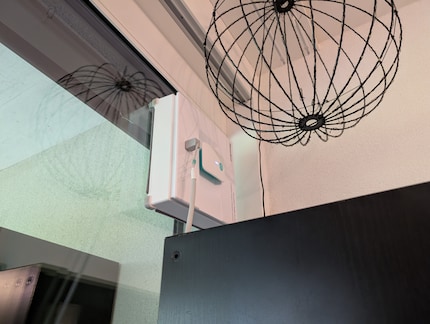
In terms of battery life, you’ve got one and a quarter hours to play around with. Despite how slow it cleans, this is enough for some windows. And it takes around one hour to recharge the battery.
With all the criticism behind us, let’s end on a positive note: the Mamibot iGlassbot W200 Skybot is the quietest window cleaning robot I’ve tested so far – as long as it doesn’t start squeaking.
The Mamibot iGlassbot W200 Skybot is cheaper than many competitors. And it works quietly. The problem is, it’s unreliable. Sometimes it doesn’t clean the entire window, sometimes it doesn’t clean the entire edge, sometimes it stops somewhere on the window and back at the starting point.
The biggest disadvantage is that I have to spray the mop itself with liquid before each clean. It takes a lot of time to find the right dosage, and the overall effort isn’t that much less than if I were to clean the windows by hand.
Pro
Contra
Gadgets are my passion - whether you need them for the home office, for the household, for sport and pleasure or for the smart home. Or, of course, for the big hobby next to the family, namely fishing.